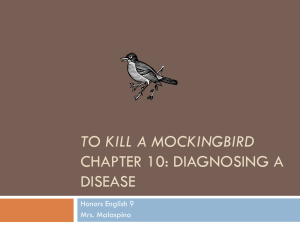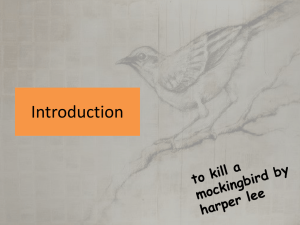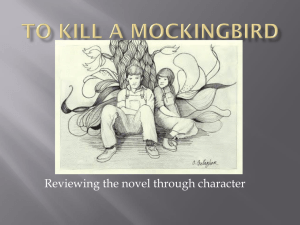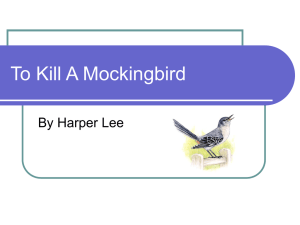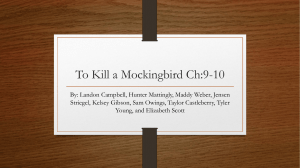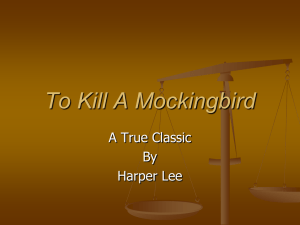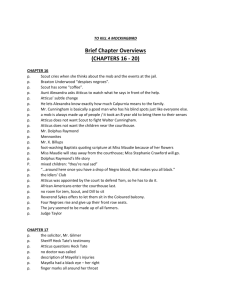Read more To Kill A Mockingbird Ch 21
advertisement
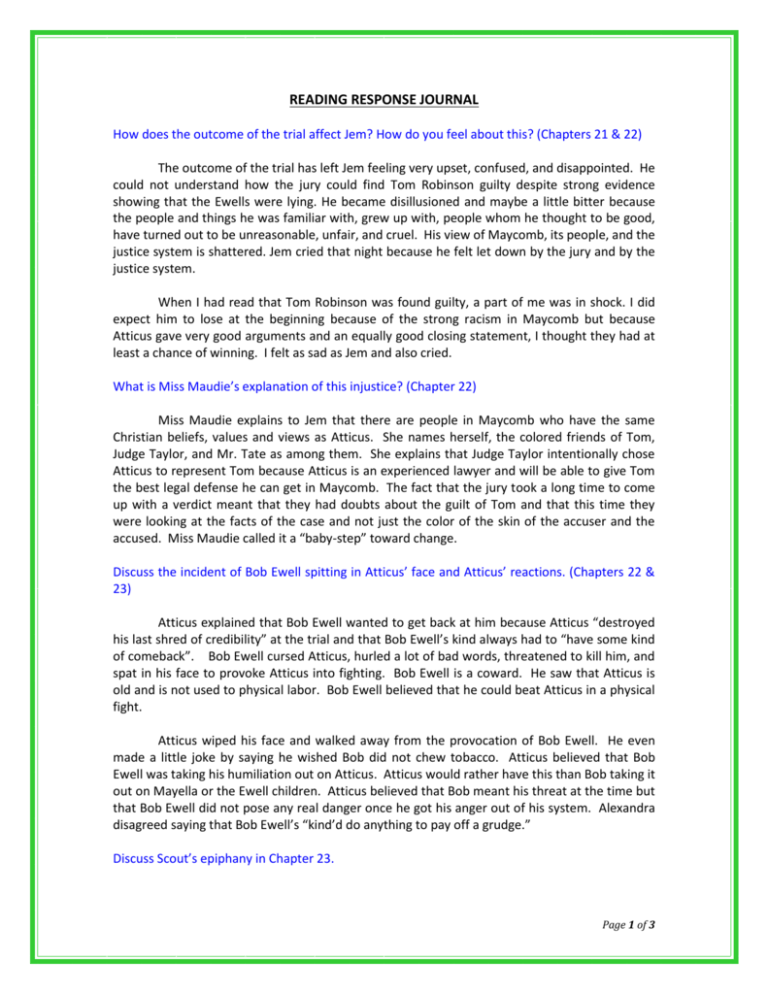
READING RESPONSE JOURNAL How does the outcome of the trial affect Jem? How do you feel about this? (Chapters 21 & 22) The outcome of the trial has left Jem feeling very upset, confused, and disappointed. He could not understand how the jury could find Tom Robinson guilty despite strong evidence showing that the Ewells were lying. He became disillusioned and maybe a little bitter because the people and things he was familiar with, grew up with, people whom he thought to be good, have turned out to be unreasonable, unfair, and cruel. His view of Maycomb, its people, and the justice system is shattered. Jem cried that night because he felt let down by the jury and by the justice system. When I had read that Tom Robinson was found guilty, a part of me was in shock. I did expect him to lose at the beginning because of the strong racism in Maycomb but because Atticus gave very good arguments and an equally good closing statement, I thought they had at least a chance of winning. I felt as sad as Jem and also cried. What is Miss Maudie’s explanation of this injustice? (Chapter 22) Miss Maudie explains to Jem that there are people in Maycomb who have the same Christian beliefs, values and views as Atticus. She names herself, the colored friends of Tom, Judge Taylor, and Mr. Tate as among them. She explains that Judge Taylor intentionally chose Atticus to represent Tom because Atticus is an experienced lawyer and will be able to give Tom the best legal defense he can get in Maycomb. The fact that the jury took a long time to come up with a verdict meant that they had doubts about the guilt of Tom and that this time they were looking at the facts of the case and not just the color of the skin of the accuser and the accused. Miss Maudie called it a “baby-step” toward change. Discuss the incident of Bob Ewell spitting in Atticus’ face and Atticus’ reactions. (Chapters 22 & 23) Atticus explained that Bob Ewell wanted to get back at him because Atticus “destroyed his last shred of credibility” at the trial and that Bob Ewell’s kind always had to “have some kind of comeback”. Bob Ewell cursed Atticus, hurled a lot of bad words, threatened to kill him, and spat in his face to provoke Atticus into fighting. Bob Ewell is a coward. He saw that Atticus is old and is not used to physical labor. Bob Ewell believed that he could beat Atticus in a physical fight. Atticus wiped his face and walked away from the provocation of Bob Ewell. He even made a little joke by saying he wished Bob did not chew tobacco. Atticus believed that Bob Ewell was taking his humiliation out on Atticus. Atticus would rather have this than Bob taking it out on Mayella or the Ewell children. Atticus believed that Bob meant his threat at the time but that Bob Ewell did not pose any real danger once he got his anger out of his system. Alexandra disagreed saying that Bob Ewell’s “kind’d do anything to pay off a grudge.” Discuss Scout’s epiphany in Chapter 23. Page 1 of 3 Jem understood Alexandra to mean being learned or educated when she mentioned them, the Finches, having “background.” It is what Alexandra is proud of as a Finch because the Finches are not rich. Scout believes that nobody is born educated or learned. She believes that if given the same opportunity as they have, Walter Cunningham can be very smart, “He just gets held back sometimes because he has to stay out and help his daddy.” Scout believes that there is nothing wrong with other people like the Cunninghams, “there’s just one kind of folks. Folks.” I agree with Scout because we are all equal according to the law and created equal in the eyes of God. No race or group of people has the right to think of themselves as superior to others. Discuss the town’s reaction to Tom Robinson’s death. (Chapters 24 & 25) Maycomb was interested in the news about Tom’s death for about two days which was the length of time it took for the county to know about it. Tom’s death was considered “typical” by the people of Maycomb – typical of a Negro to “cut and run” the first chance he saw without thinking about the future. They did not think of Tom losing hope about his situation because he saw how unfairly he was treated at the trial. He also did not get any moral support from his family since they were not allowed to visit him. There were a handful of people like the Finches, Miss Maudie – “people in this town with background” who believe that fair play and a fair trial is for everybody, not just whites, and who have enough humility to think themselves fortunate for not being born a Negro. Meanwhile, Mr. Underwood was embittered by the news of Tom’s death. Though he did not like Negroes, he wrote and editorial so children could understand that it is a sin to kill cripples no matter what. “He likened Tom’s death to the senseless slaughter of songbirds by hunters and children.” Mr. Underwood was saying it was wrong to hurt or kill someone who is already at a severe disadvantage to start with and who does no one harm. Discuss the similarities between Hitler’s oppression and killing of Jews and Maycomb’s racism and segregation. (Chapter 26) Both are based on the wrong belief that a race or group of people are superior to another and that the “inferior” race or group do not deserve to be treated as human beings. The oppression of Jews is led by Hitler but followed by the Germans. Although there are many Jews, Hitler is able to get away with what he is doing because nobody strong enough is standing up to Hitler and the Germans. Maycomb’s racism and segregation is similar except that the coloreds are not locked up or killed by the millions. Except for Atticus, no one in Maycomb speaks against this inequality. Another similarity is that both the Germans and Maycomb residents are supposed to be reasonable people. Hitler’s Germany was trying to do away with religion though and Maycomb residents are supposed to be Christians. Write down phrases or passages in this section of the novel that seem to be important to your understanding of what’s going on. Ch. 23: “His kind’d do anything to pay off a grudge. You know how those people are.” Page 2 of 3 Alexandra does not lightly dismiss Bob Ewell’s threat. She believes that he meant to carry out his threat and harm Atticus. Ch. 23: “I think I’m beginning to understand why Boo Radley’s stayed shut up in the house all the time . . . wants to stay inside.” Jem thinks that Boo Radley chooses to “stay inside” because Boo sees the ugliness in the world like how people look down on other people, or how some are mean to those who are deemed inferior. Boo does not want to be a part of that kind of world. Ch. 25: “Mr. Ewell said it made one down and about two more to go.” This line shows the resolve or Mr. Ewell to get back at those whom he believes did him wrong. Ch. 27: By the middle of October, only two small things out of the ordinary happened to two Maycomb citizens… three things … they did. Bob Ewell was determined to get back at those connected with the trial. Ch. 27: “Somebody just walked over my grave.” Alexandra has a sudden premonition that something bad is about to happen but she ignores it. Ch. 30: Atticus put his face in my hair … his youthful step had returned. Atticus was glad Scout understood that he and Mr. Tate were doing the right thing regarding the death of Bob Ewell. He felt relieved that he did not disappoint his children when he did the right thing about Tom’s case and with Bob Ewell’s death there is closure. Page 3 of 3
